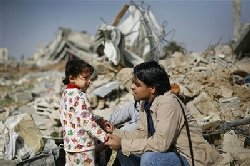The war on Gaza has taken a heavy emotional and mental toll on the people of the Gaza Strip. Doctors say that at least half of the population need professional help to come to terms with the war.
Palestinian men have been hit especially hard. Many of them have spent the last two years struggling to find work under Israel's blockade of the territory and the horrors of the war have made things harder and more traumatic.
Al Jazeera's Zeina Awad reports from a mental health clinic in Gaza City.
Fouzan has four children, no job, and constant anxiety about the future.
He lost everything when Israeli missiles struck his home, his sewing factory, and his garden.
He says he has lost his will to live and he finds it hard to get out of bed. He describes his life as a "dark tunnel, with no light in sight".
"I spent years working hard and saving money to buy my sewing machines, one by one, to build up my business. It was all gone, just like that, in a second," he said.
"I don’t know what I am going to do."
Business impossible
Fouzan's problems go back to when he lost his clients abroad, as Israel tightened its siege on Gaza and made it impossible for him to export the clothes he was making.
As his situation worsened, he was forced to sell equipment and furniture just to put food on the table. And when the war started, it took away all he had left.
"It was a very difficult situation. My children were scared and they wanted me to comfort them," he said.
"What was I supposed to do? I was scared, but I would control myself to make it seem like everything was okay.
"I don't sleep, very rarely, maybe a couple of hours per night. I am constantly worried. Even if I wanted to get out, to take a break and go somewhere to forget a little, I can't because the crossings are closed.
"I can't even take a walk along the shore because there are warships in the sea the whole time and they may aim at me," he said.
'Only relief'
The Gaza Community Mental Health Program (GCMHP) is the only relief that Fouzan is able to get.
He has been a patient there for over a year and sees his doctor twice a week.
The GCMHP, Gaza's largest mental health clinic, employs nearly 30 psychiatrists, psychologists, social workers and nurses.
Although its headquarters were hit during the war, doctors continue to work around the clock to treat the ever-increasing number of Palestinian patients living in the Gaza Strip.
Dr Eyad Sarraj, the director of the GCMHP, said: "Adults are the symbol of protection, providing and power for the children.
"Adults have already been lost as providers because of the economic siege. During this war, they were lost as protectors.
"Children were looking up to them to ask them, 'Where is a safe place? How can you protect me?'
"Some felt defeated as men, defeated in the struggle because they could not defend their children."
Saraj says that at least half of the people living in Gaza need professional help to cope with the war. Many of them have a constant feeling of insecurity.
Like Fouzan, they live with a sense of collective trauma, built up over years - and even generations.
PHOTO CAPTION
Saja Abed Rabbo, 5, stands amid the rubble of her devastated neighborhood in Jebaliya, northern gaza Strip, Jan. 25, 2009, talking to Gaza trauma counselor Mustafa Haj-Ahmed.
Source: Aljazeera.net


 Home
Home Discover Islam
Discover Islam Quran Recitations
Quran Recitations Lectures
Lectures
 Fatwa
Fatwa Articles
Articles Fiqh
Fiqh E-Books
E-Books Boys & Girls
Boys & Girls  Ramadan
Ramadan Fatwa Audios
Fatwa Audios Month of Mercy
Month of Mercy Women
Women Eed Al- Fitr
Eed Al- Fitr Food Recipes
Food Recipes Videos
Videos

 Prayer Times
Prayer Times












